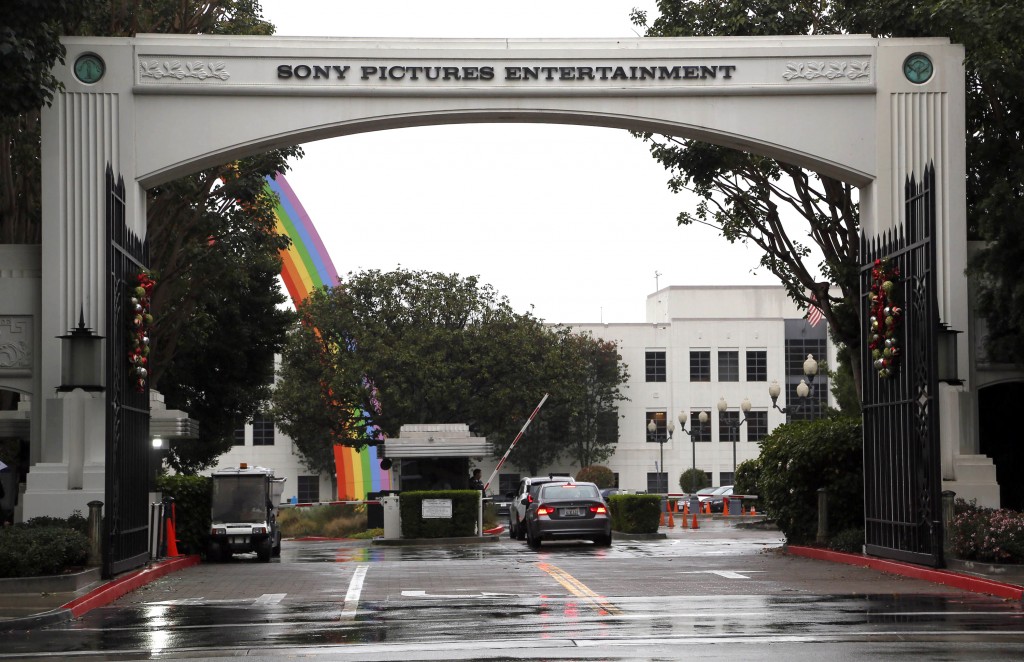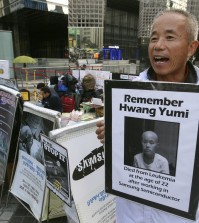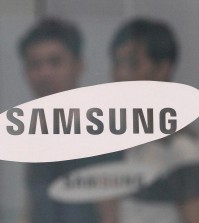- California Assembly OKs highest minimum wage in nation
- S. Korea unveils first graphic cigarette warnings
- US joins with South Korea, Japan in bid to deter North Korea
- LPGA golfer Chun In-gee finally back in action
- S. Korea won’t be top seed in final World Cup qualification round
- US men’s soccer misses 2nd straight Olympics
- US back on track in qualifying with 4-0 win over Guatemala
- High-intensity workout injuries spawn cottage industry
- CDC expands range of Zika mosquitoes into parts of Northeast
- Who knew? ‘The Walking Dead’ is helping families connect
Sony hackers reference 9/11 in new threats against theaters

Cars enter Sony Pictures Entertainment headquarters in Culver City, Calif. on Tuesday, Dec. 2, 2014. The FBI has confirmed it is investigating a recent hacking attack at Sony Pictures Entertainment, which caused major internal computer problems at the film studio last week. (AP Photo/Nick Ut)
NEW YORK (AP) — Hackers calling themselves Guardians of Peace made ominous threats Tuesday against movie theaters showing Sony Pictures’ film “The Interview” that referenced the terrorist attacks of September 11, 2001.
The group also released a trove of data files: what they called the beginning of a “Christmas gift.” But GOP, as the group is known, included a message warning that people should stay away from places where “The Interview” will be shown, including the upcoming premiere. Referencing 9/11, it urged people to leave their homes if located near theaters showing the film.
“The Interview” is a comedy in which Seth Rogen and James Franco star as television journalists involved in a CIA plot to assassinate North Korean leader Kim Jong Un. Its New York premiere is scheduled for Thursday at Manhattan’s Landmark Sunshine, and is expected to hit theaters nationwide on Christmas Day. It premiered in Los Angeles last week.
Rogen and Franco pulled out of media appearances Tuesday, canceling a planned New York Q&A event to be streamed by Buzzfeed. After avoiding the media last week as the hacking scandal unfolded, the two stars had appeared Monday on “Good Morning America” and Rogen guested on “The Colbert Report.”
A representative for Rogen said he had no comment. A spokeswoman for Franco didn’t immediately respond to queries Tuesday.
Patrick Corcoran, spokesman for the National Association of Theater Owners, wouldn’t comment on the threats.
In a statement, the FBI said it is aware of the threats and “continues to work collaboratively with our partners to investigate this matter.” It declined to comment on whether North Korea or another country was behind the attack. Speculation about a North Korean link to the Sony hacking has centered on that country’s angry denunciation of the film. Over the summer, North Korea warned that the film’s release would be an “act of war that we will never tolerate.” It said the U.S. will face “merciless” retaliation.
In their warning Tuesday, the hackers suggested Sony employees make contact via several disposable email addresses ending in yopmail.com. Frenchman Frederic Leroy, who started up the yopmail site in 2004, was surprised to learn the Sony hackers were using yopmail addresses. He said there was no way he could identify the users.
“I cannot see the identities of people using the address … there is no name, no first name,” he said in a phone interview with The Associated Press. He said yopmail is used around the world but there are “hundreds and hundreds” of other disposable email sites.
Leroy, who lives in Barr, outside Strasbourg in eastern France, said he heard about the Sony hackers yesterday on the radio but knows nothing more. He said he has not been contacted by any authorities.
Since Sony Pictures was hacked by GOP late last month in one of the largest data breaches ever against an American company, everything from financial figures to salacious emails between top Sony executives have been dumped online.
Separately Tuesday, two former employees of Sony Pictures Entertainment sued the Culver City, California company for not preventing hackers from stealing nearly 50,000 social security numbers, salary details and other personal information from current and former workers. The federal suit alleges that emails and other information leaked by the hackers show that Sony’s information-technology department and its top lawyer believed its security system was vulnerable to attack, but that company did not act on those warnings.















